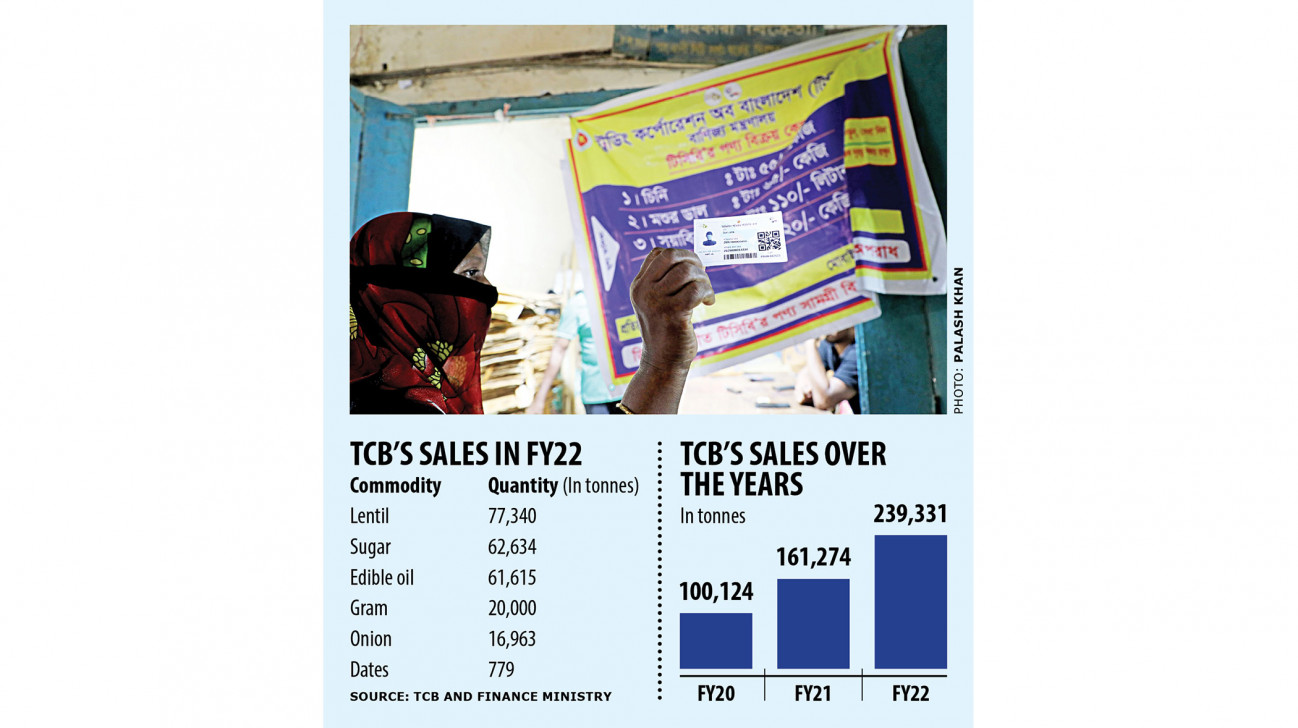Originally posted in The Daily Star on 30 August 2022
TCB sees 12-fold rise in sales
An indication of rising demand, experts say

Sales of the Trading Corporation of Bangladesh (TCB) have increased consistently over the last six years, reflecting a rise in demand for essential commodities at below market prices.
“Although the government has expanded the TCB’s operations, it is still inadequate against the rising demand,” said Towfiqul Islam Khan, senior research fellow of the Centre for Policy Dialogue.
The volatility of essential commodity prices and weakness in market monitoring have made the TCB a critical resort for many low-income families.
“So, the TCB’s operations need to be expanded in small cities, industrial zones and rural areas while its administrative capacity and good governance need more attention as well,” he added.
Khan went on to say that the government should asses the organisation for its efficacy as it is crucial to examine whether its operations and initiatives, such as the family cards programme, is serving their intended purpose.

The state-owned corporation’s sales in the market for essential commodities, namely edible oil, sugar, onion and lentils, grew to 2.39 lakh tonnes in fiscal 2021-22. This is about 12 times higher than what it was in fiscal 2016-17, when it sold 20,500 tonnes of various essential goods, TCB data shows.
“Our activities have increased a lot compared to the past in the wake of the peoples’ eroding incomes following the Covid-19 outbreak and Russia-Ukraine war,” said TCB Chairman Ariful Hassan.
Having begun its journey in 1972 with the aim of supplying essential commodities and industrial raw materials at subsidised rates, the TCB’s role was downsized in the eighties as a part of the government’s move to reduce the state’s role in market activities.
However, the current government has strengthened the TCB in order to increase the state’s capacity to contain market prices and provide low-income people with access to essential commodities at affordable prices.
TCB’s overall sales so far this fiscal year are estimated to be 2.75 lakh tonnes, as per data from the finance ministry.
Regarding their plan to sell a record amount of goods this fiscal year, the TCB chairman said oil, lentils, sugar and onions are being supplied to one crore families each month. “This activity will continue throughout the year,” he added.
“One crore families means about five crore people, which is one-third of the total population. So if necessary, we will consider increasing the supply of commodities in the future,” Hassan said.
The increased operations takes place at a time when soaring consumer prices have hit low and fixed-income households, resulting in long queues behind the TCB’s open market sales trucks every day.
Inflation, a measure of change in the prices of commodities and services, stood at 7.48 per cent in July while food inflation was 8.19 per cent at the same time, down slightly from a multi-year high of 8.37 per cent the previous month, according to the Bangladesh Bureau of Statistics.
But despite registering overall growth in sales volume, the state corporation’s activities remain chiefly concentrated on the month of Ramadan.
Hassan said the TCB remains active in the market during Ramadan in order to increase the supply of commodities and contain any potential price hike.
However, the organisation’s operating losses have risen because of the increasing sale of commodities, he added.
The TCB’s operating loss from selling commodities grew 181 per cent year-on-year to Tk 1,182 crore in fiscal 2021-22 from Tk 420 crore the previous year, as per finance ministry data.
The TCB’s operating losses are forecasted to increase to Tk 1,289 crore in the current fiscal year.
Accordingly, the corporation’s net loss, which was Tk 302 crore in fiscal 2020-21, is likely to increase to Tk 1,262 crore during the ongoing fiscal year.
Hassan then said the TCB receives subsidies from the state coffer to buy essential commodities for sale at below market prices.


